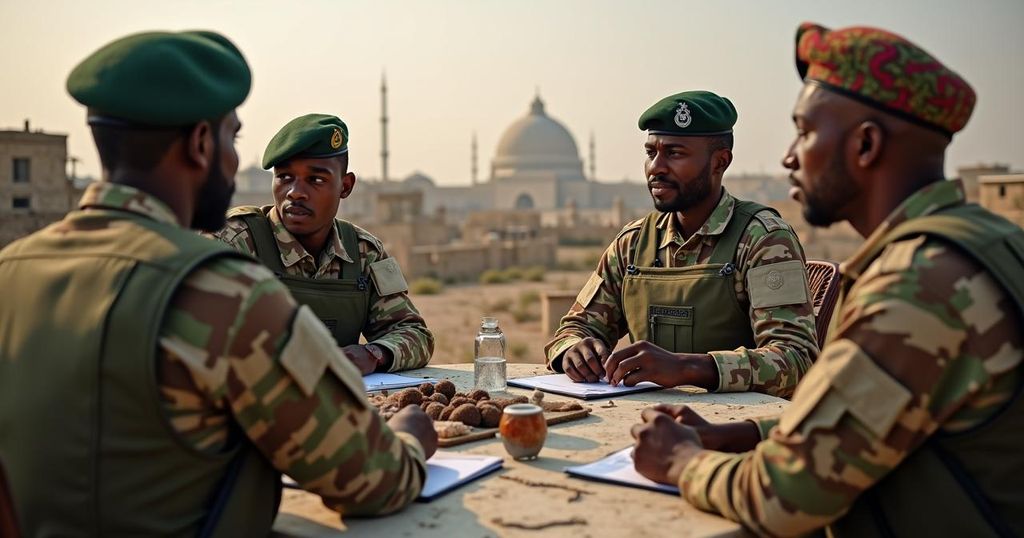The presidents of Somalia, Eritrea, and Egypt met in Asmara to enhance security cooperation in response to rising tensions in the Horn of Africa, particularly Somalia’s fight against al-Shabab. They emphasized respect for sovereignty and territorial integrity, coordinated efforts against terrorism, and the importance of a stable regional environment. This collaboration poses potential challenges to Ethiopia, which has significant military involvement in Somalia.
The leaders of Somalia, Eritrea, and Egypt convened a pivotal summit in Asmara, the capital of Eritrea, to reinforce their collaborative efforts in enhancing regional security. This meeting, initiated by Eritrean President Isaias Afwerki, included Egypt’s President Abdel Fattah al-Sisi and Somalia’s President Hassan Sheikh Mohamud. Amid escalating tensions in the Horn of Africa, the three nations committed to improving stability in the region, particularly as Somalia continues its struggle against the al-Shabab armed group. The joint declaration issued by the Eritrean government emphasized the necessity for mutual respect for the sovereignty and territorial integrity of the regional countries. The leaders condemned any external interference in the region’s internal affairs, regardless of the justification, and pledged to coordinate their efforts to foster a peaceful environment for sustainable development. Central to their discussions was the dire security situation in Somalia, where the national army is currently engaged in combat with al-Shabab militants. The presidents affirmed their commitment to intensifying cooperation in combating terrorism, safeguarding territorial borders, and maintaining national integrity. This security collaboration might evoke concerns from Ethiopia, which has deployed a significant number of troops in Somalia to counter affiliate groups linked to al-Qaeda. However, relations between Ethiopia and Somalia have soured over Somalia’s recent agreements to construct a port in the unrecognized region of Somaliland, prompting Somalia to secure a substantive military agreement with Egypt earlier this year. This agreement also involves Egypt’s commitment to contribute troops to a new African Union initiative aimed at combating al-Shabab. The backdrop of these discussions also includes the long-standing disputes between Egypt and Ethiopia regarding the latter’s construction of the Grand Ethiopian Renaissance Dam on the Nile River. Furthermore, Eritrea has historically had its own tensions with Ethiopia, despite military alliances during the recent Tigrayan conflict.
The Horn of Africa has been a region rife with conflict and instability, particularly due to the activities of militant groups and historical disputes between neighboring countries. Somalia has faced ongoing challenges with the al-Shabab group, which seeks to impose its strict interpretation of Islamic law and regularly perpetrates acts of terrorism within and outside Somalia. The complex dynamics in the region are further complicated by Ethiopia’s military involvement in Somali affairs, alongside long-standing tensions with Egypt related to water rights from the Nile River. Eritrea, having its own contentious relationship with Ethiopia, adds another layer to the intricate political landscape in the Horn of Africa as it seeks to position itself in regional security matters following its past military engagements.
The summit involving the leaders of Somalia, Eritrea, and Egypt signals a concerted effort to enhance security cooperation amidst the ongoing threats posed by armed groups such as al-Shabab. The mutual commitment to uphold sovereignty and defend against external interference reflects a strategic alignment among these nations. However, the implications of this partnership may create tensions with Ethiopia, which remains heavily involved in Somalia’s security landscape. The evolving political interactions in this region warrant close attention as they may profoundly influence regional stability and security dynamics.
Original Source: www.aljazeera.com






